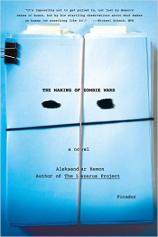The Making of Zombie Wars
Review
The Making of Zombie Wars
Readers familiar with the work of Aleksandar Hemon only through his 2013 essay collection, THE BOOK OF MY LIVES, a book that included the heartbreaking story of his infant daughter's death from a rare form of brain cancer, are in for a surprise with his novel, THE MAKING OF ZOMBIE WARS, a dark comedy about stunted ambition and the consequences of unchecked desire. Though it shines at times with Hemon's wit and benefits from a quirky supporting cast of characters, its brightest moments only serve to spotlight its shortcomings as a coherent work of fiction.
Hemon has taken a risk in choosing a protagonist who is more likely to grate than endear. Joshua Levin, a 33-year-old graduate of Northwestern University, can't do better for himself than teach a sullen handful of students in an ESL class in Chicago and participate in a weekly screenwriting workshop whose members seem doomed never to produce a finished script, let alone land a movie deal. He uses the workshop to flesh out his screenplay-in-progress, Zombie Wars, a script that features the inartfully named Major Klopstock in gruesome mortal combat with an onslaught of undead foes. "What he wanted to do was nothing, every day, all day long, until the glacier of time ground everything back into its smooth shape" is Hemon's apt summary of Joshua's slacker personality. Magnifying Joshua's discontent is a prickly relationship with his father, Bernie, whose abandonment of his wife for a younger woman still stings, even as the son learns his father is suffering from prostate cancer.
"Scene to scene, THE MAKING OF ZOMBIE WARS vibrates with energy and madcap humor, but in the end...it's much less than the sum of its parts."
As inert as he may be in confronting life's demands, Joshua has managed to fashion a committed relationship with a Japanese-American woman named Kimiko. His "beautiful Zen mistress" is a child psychologist specializing in divorce trauma, whose attraction to him is as inexplicable to him as it is to us. But when the voluptuous Ana, a married Bosnian émigré and one of his ESL students, signals her availability, it doesn't take much in the way of predictive ability to know that Joshua's romantic life is headed for serious complication. Though "indelible sorrow" is something Ana "constantly radiated," she has no difficulty communicating her sexual desires to someone as willing to receive them as Joshua.
Some of Hemon's most effective characterization involves Ana and a small cadre of Bosnians that includes her grim second husband Esko, her teenage daughter Alma, and Esko's carefree friend Bega, one of the other students in Joshua's screenwriting workshop. The Bosnians, survivors of the 1990s war that devastated their country, have fled Sarajevo for America, but almost a decade of life in the United States hasn't allowed them to forget "how sad and displaced they really were." At the seedy bar where he and Joshua hang out after a typically unproductive workshop, Bega brags that he and his countrymen have learned to "surf catastrophe," a boast that seems to have the ring of truth as we watch their messy, complicated lives intersect with Joshua's.
Hemon's inventiveness and wit shine as he peppers the novel with cullings from Joshua's laptop, "brimming with script ideas, none close to being actualized." Among them are "Script Idea #99: A foxhunt from the fox's point of view" or "Script Idea #144: A man saves the life of his comrade, which impresses his girlfriend so much that she suggests a threesome." Hemon often uses these bizarre gleanings to add an ironic commentary on the plot.
In the final 40 pages of the novel, Hemon unfurls scenes of gratuitous violence that involve some characters even less likable than Joshua and his vengeful, drug-drenched landlord Stagger, a Desert Storm veteran wielding a samurai sword, getting their just desserts. But these episodes are more squirm-inducing than satisfying, and leave us with the uneasy feeling that Joshua finally has dug himself a hole from which no amount of imaginative screenwriting and repentance will allow him to escape.
Scene to scene, THE MAKING OF ZOMBIE WARS vibrates with energy and madcap humor, but in the end, and most disappointingly for a writer of Hemon's unquestionable skill, it's much less than the sum of its parts. Hemon can be brilliant at setting up promising scenes or in firing out dialogue that sizzles with wit. It's too bad his prodigious talent wasn't better deployed in what could have been a black comedy classic.
Reviewed by Harvey Freedenberg on May 15, 2015
The Making of Zombie Wars
- Publication Date: May 3, 2016
- Genres: Fiction
- Paperback: 320 pages
- Publisher: Picador
- ISBN-10: 1250094623
- ISBN-13: 9781250094629





